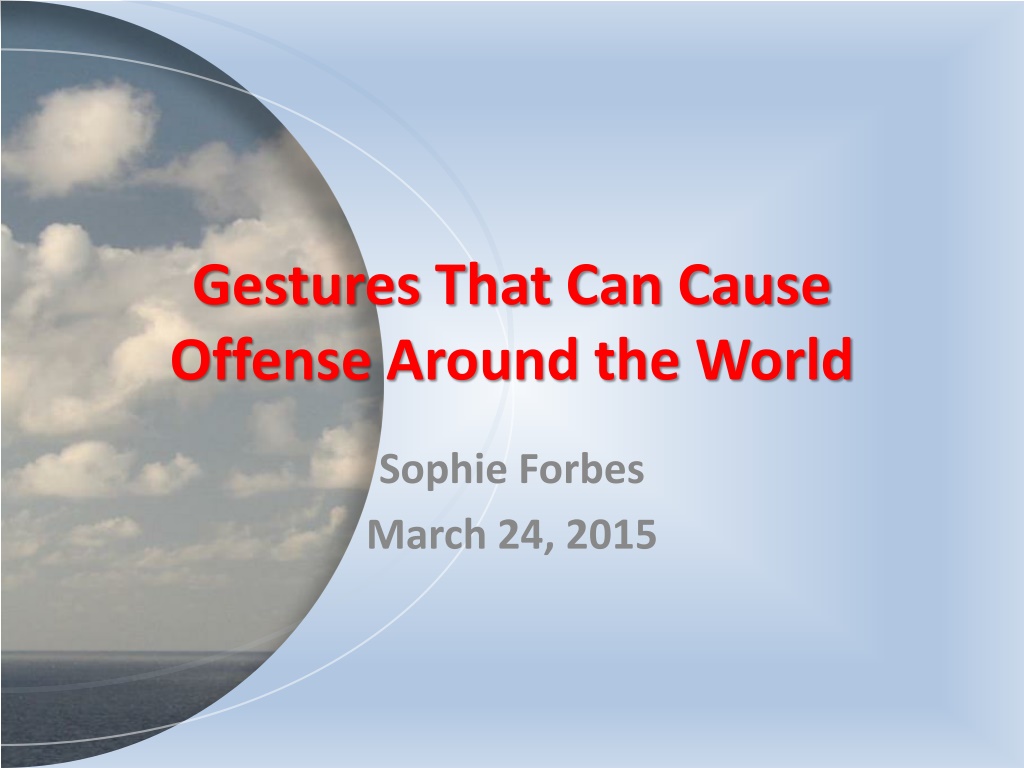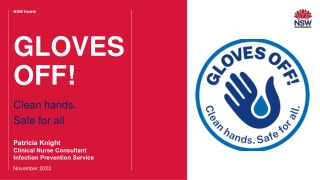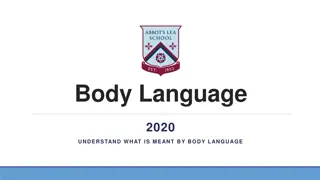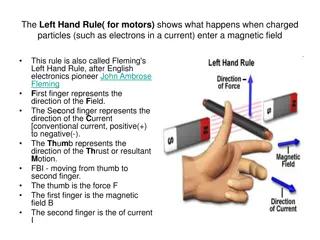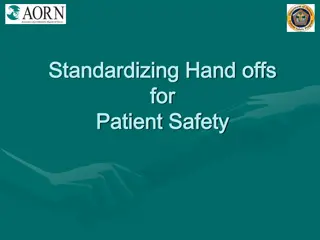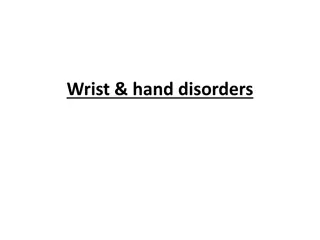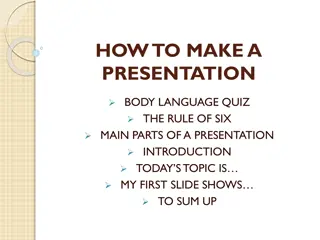Hand Gestures Around the World: What Not to Do
Communicating effectively involves more than just words - hand gestures play a significant role. However, certain gestures that may be innocuous in one culture can be highly offensive in another. For example, the OK sign in the US can insult individuals in Greece, Spain, and Brazil, the chin flick in Belgium means "get lost," and the forearm jerk gesture is offensive in parts of southern Europe. Understanding these cultural differences is crucial to avoid unintentionally offending locals while traveling.
Download Presentation

Please find below an Image/Link to download the presentation.
The content on the website is provided AS IS for your information and personal use only. It may not be sold, licensed, or shared on other websites without obtaining consent from the author. Download presentation by click this link. If you encounter any issues during the download, it is possible that the publisher has removed the file from their server.
E N D
Presentation Transcript
Gestures That Can Cause Offense Around the World Sophie Forbes March 24, 2015
One of the main problems travelers face is communicating with the locals. Even if you never leave home without your trusty phrase book, communication is as much about nonverbal cues as it is about talking. In fact, people rely more heavily on hand gestures and body language when in situations where they are unable to verbally interact with someone.
Take the OK sign the simple hand signal where you put your thumb and first finger together to create a circular shape. In the U.S. we use it to convey agreement and compliance. Yet it is seen as offensive in Greece, Spain, and Brazil. In those countries it means that you are calling someone an asshole. In Turkey, that sign is also an insult toward gay people.
So aside from keeping your hands firmly in your pockets while you are traveling, what can you do to ensure that you don t insult the locals or end up in a bar brawl? The last time I checked, there was no section in any of my phrasebooks for hand gestures.
1. The chin flick. Brushing the back of your hand underneath your chin in a flicking motion means get lost in Belgium, northern Italy, and Tunisia. In France, this gesture is known as la barbe ( the beard ) and is the hand-sign equivalent of macho grandstanding.
2. The fig. A clenched fist with your thumb between your first and second fingers means screw you (to put it mildly) in Turkey, Russia, and Indonesia. And in some countries it symbolizes lady parts. You know what I mean.
3. Forearm jerk. This is the action of punching your fist into your elbow joint while raising the other fist up in front of you. It will not get you a positive reaction in most parts of southern Europe or Brazil, and it s used commonly by soccer fans wanting to send an offensive message to the fans of the opposing team.
4. The moutza. In Greece, Mexico, the Middle East, and Africa, the action of raising your open hand, palm out, with spread fingers in front of someone is a serious sign of displeasure. Possibly one of the oldest hand gestures still in use, it dates all the way back to ancient Byzantium, when criminals were chained to donkeys and paraded through the streets, where locals would rub their own feces onto the prisoner.
5. The cutis. Flicking your thumb from the back of your upper front teeth toward someone is seriously nasty in India and Pakistan and simply means f*** you. Very nice. This sign will likely get you ejected from any place of business and not welcomed back.
6. Five fathers. Arab and Caribbean countries see the action of pointing your right index finger and the grouped finger tips of your left hand as a way of saying, you have five fathers. Or, in harsher terms, your mother is promiscuous. So if you want to get deported in the Middle East, this is your go-to.
THERE ARE ALSO SEVERAL GESTURES THAT WE USE ON A DAILY BASIS IN THE U.S., ALMOST AS A REFLEX, THAT MEAN SOMETHING COMPLETELY DIFFERENT ELSEWHERE.
7. Head shake. Most people assume that nodding your head is the universal sign for yes and shaking your head is the sign for no. But in Greece and Bulgaria, these actions are reversed. This can lead to some serious confusion if you are being hit on or trying to order food off a menu.
8. Crossing your fingers. In Vietnam, crossing your fingers, as we would in the U.S. to wish for luck, depicts a woman s genitalia and is considered extremely insulting if aimed at another person. It is the hand-sign alternative of calling someone the c-word.
9. Horns. The placement of your fingers to show horns, usually known as the symbol for rock on, has a different meaning in Spain, Greece, and Italy where it is called the corna and is considered a suggestive gesture made to a man to imply that his wife is cheating on him. It dates back more than 2,500 years and signifies a bull s horns.
